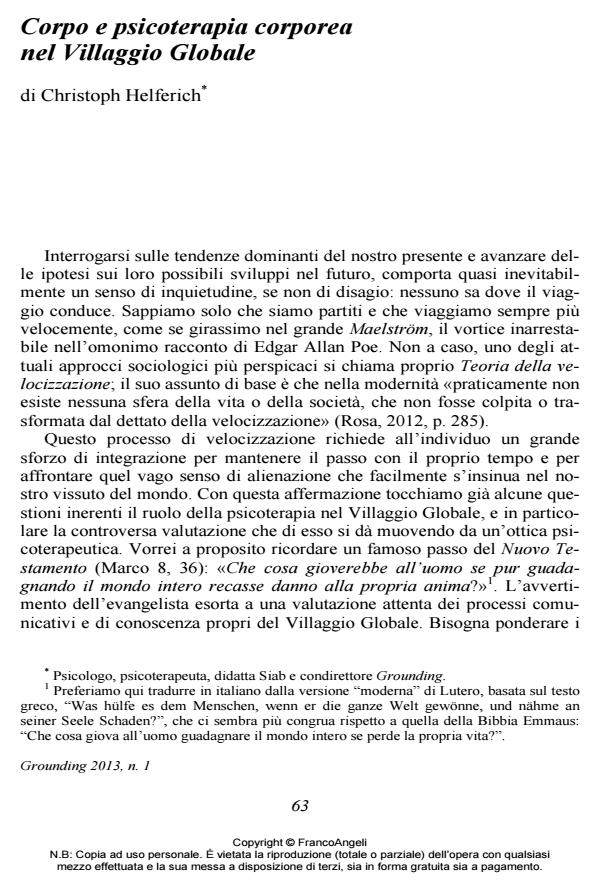Corpo e psicoterapia corporea nel Villaggio Globale
Journal title GROUNDING
Author/s Cristoph Helferich
Publishing Year 2013 Issue 2013/1
Language Italian Pages 15 P. 63-77 File size 370 KB
DOI 10.3280/GRO2013-001005
DOI is like a bar code for intellectual property: to have more infomation
click here
Below, you can see the article first page
If you want to buy this article in PDF format, you can do it, following the instructions to buy download credits

FrancoAngeli is member of Publishers International Linking Association, Inc (PILA), a not-for-profit association which run the CrossRef service enabling links to and from online scholarly content.
Body and body psychotherapy in the global village.The reality of the global village affects body psychotherapy strongly, challenging traditional basic concepts such as "nature", "body", or "personal identity". The essay inquires into these changes, dwelling on the following three aspects: a) the concepts of "body" and "nature" in the woks of the founders of body psychotherapy; b) the impact of advanced tecnology and virtual communication on these concepts; c) the task of body psychotherapy today: raising awareness for the value of "nature", both the external nature surrounding us and our internal, bodily nature, even if this "nature" con no longer be taken as an actuality, but has become an object of our choices and lifestyles.
Keywords: Body psychotherapy, global village, nature, choice
- Aristotele (1967). La fisica. Napoli: Loffredo.
- Böhme G. (2011). Das Schwinden der Natur [Il dileguarsi della Natura]. Manoscritto inedito.
- Böhme G. (2003). Leibsein als Aufgabe. Leibphilosophie in pragmatischer Hinsicht [Il compito di essere corpo. Filosofia del corpo dal punto di vista pragmatico]. Reutlingen: Die Graue Edition.
- Böhme G. (2002). Die Natur vor uns. Naturphilosophie in pragmatischer Hinsicht [La natura davanti a noi. Filosofia della natura dal punto di vista pragmatico]. Reutlingen: Die Graue Edition.
- Buti Zaccagnini G. (2010). La funzione del setting in analisi bioenergetica. In Cinotti N. & Zaccagnini C. (a cura di). Analisi bioenergetica in dialogo. Raccolta di scritti (pp. 167-174). Milano: Franco Angeli.
- Helferich C. (2010). L’eredità romantica nella psicoterapia corporea. Grounding. La rivista italiana di analisi bioenergetica, 1-2: 113-161.
- Helferich C. (2004). Il setting in psicoterapia corporea. In Id., La “vita buona”. La ricerca esistenziale tra filosofia e psicoterapia corporea (pp. 133-139). Roma: Armando Editore.
- Klopstech A. (2010). Psicoanalisi e psicoterapie corporee in dialogo. In N. Cinotti & C. Zaccagnini (Eds.) Analisi bioenergetica in dialogo. Raccolta di scritti (pp. 138-148). Milano: Franco Angeli.
- Lowen A. (1975). Bioenergetics. New York: Coward, McCann & Geoghen Inc. Trad. it. Bioenergetica. Milano: Feltrinelli 1983.
- Lowen A. (1970). Pleasure. A Creative Approach to Life. New York: Coward, McCann & Geoghen Inc. Trad. it. Il piacere. La via alla vita creativa. Roma: Astrolabio, 1984.
- Lowen A. (1958). Il linguaggio del corpo. Milano: Feltrinelli 1978. McLuhan M. & Fiore Qu. (1967). The Medium is the Massage. New York: Random House. Trad. it. Il Medium è il Massaggio. Milano: Feltrinelli 1968.
- Metzner-Szigeth A. (2008). Von Cyber-Identitäten, virtuellen Gemeinschaften und vernetzter Individualisierung – sozial-psychologische Überlegungen [Di identità Cyber, comunità virtuali e individualismo interconnesso – considerazioni socio-psicologiche]. Sic et Non. Zeitschrift für Philosophie und Kultur. Im Netz, IX: 1-35.
- Montaigne M. de (1588). Dell’esperienza. Trad. it. F. Garavana (Ed.), Saggi. Vol. II (pp. 1422-1496). Milano: Adelphi 1966.
- Nancy J.-L. (2000). L’Intrus. Parigi: Galilée. Trad. it. L’intruso. Napoli: Cronopio, 2000.
- Rosa H. (2012). Umrisse einer Kritischen Theorie der Geschwindigkeit [Abbozzo di una teoria critica della velocità]. In Id., Weltbeziehungen im Zeitalter der Beschleunigung [Relazioni col mondo nel periodo della velocizzazione] (pp. 269-323). Francoforte sul Meno: Suhrkamp.
- Rosa H. (2011). Beschleunigung und Depression – Überlegungen zum Zeitverhältnis der Moderne [Velocizzazione e depressione – riflessioni sul rapporto col tempo della modernità]. In Psyche. Zeitschrift für Psychoanalyse und ihre Anwendungen, LXV, 11:1041-1060.
- Sachs-Hombach K. (2009). Bildtheorien. Anthropologische und kulturelle Grundlagen des Visualistic Turn [Teorie dell’immagine. Fondamenti antropologiche e culturali del Visualistic Turn]. Francoforte sul Meno: Suhrkamp.
- Schneider G. (2012). Die Psychoanalyse ist ein Humanismus [La psicoanalisi è un umanesimo]. Psyche. Zeitschrift für Psychoanalyse und ihre Anwendungen, LXVI, 8: 675-701.
- Wiegerling K. (2011). Philosophie intelligenter Welten [Filosofia di mondi intelligenti]. Moncaco di Baviera: Wilhelm Fink.
- Wiegerling K. (2008). Medienethik als Medienphilosophie [Etica dei media come filosofia dei media]. In V. Steenblock (Ed.), Kolleg Praktische Philosophie. Vol. II, Grundpositionen und Anwendungsprobleme der Ethik [Corso di filosofia pratica. Vol. II, Posizioni di base e problemi d’applicazione dell’etica] (pp. 222-252). Stoccarda: Reclam.
Cristoph Helferich, Corpo e psicoterapia corporea nel Villaggio Globale in "GROUNDING" 1/2013, pp 63-77, DOI: 10.3280/GRO2013-001005